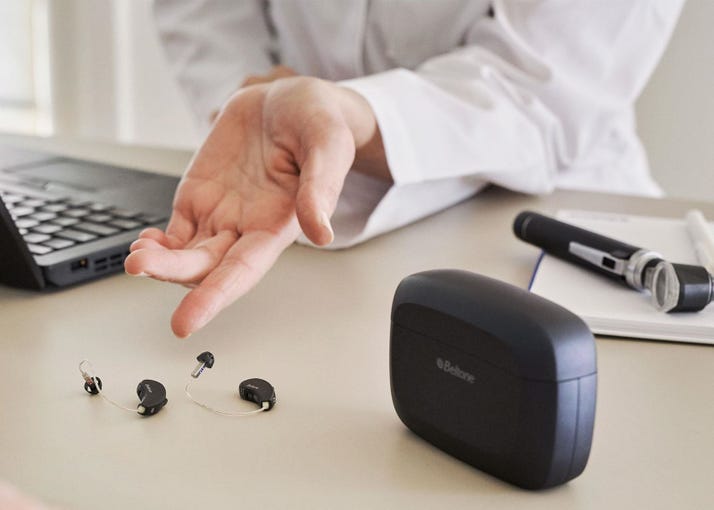
Our Verdict
Beltone is a hearing solutions company with a history of over 80 years. Beltone’s portfolio of hearing aids, wireless accessories and mobile applications can address different levels of hearing loss, lifestyles, fit preferences and budgets.
Key Features
Inclusive hearing loss coverage: Beltone offers several behind-the-ear (BTE) and in-the-ear (ITE) hearing aid models with various designs, colors and features for people with mild to profound hearing loss.
Technological innovation and customer experience: Beltone has received multiple awards and recognitions for both product innovation and customer service.
Post-purchase support: Customers have access to 1,500 Beltone brick-and-mortar locations nationwide, as well as phone assistance from a hearing care professional with Beltone Remote Care Live, annual hearing consultations, product warranties and other customized services.
Founded in Chicago in 1940, Beltone is the result of Sam and Faye Posen’s interest in finding a way to help a friend with hearing loss. Today, Beltone is part of GN Group, one of the largest hearing technology companies in the world. Beltone provides a variety of hearing aid solutions and accompanying apps and accessories to help people with mild to profound hearing loss.
Pros
- NVariety of hearing aid models appropriate for a wide range of hearing loss severity
- NWide range of prices to suit most budgets
- NPersonalized care available from hearing health professionals
Cons
- NBeltone hearing aids are exclusive to and generally only available at Beltone hearing care centers
- NPricing can vary by market given network model
Beltone Hearing Aids at a Glance
Cost: Prices start at $799 for a pair of Jabra Enhance Plus hearing aids, which can be purchased online without a prescription by people with mild to moderate hearing loss. Prices start at $2,000 for a pair of prescription-grade hearing aids, which can be purchased at a Beltone store with a valid prescription.
Technology: Beltone’s latest generation of hearing aids have surround sound capabilities, up to 30 hours of battery life on a single charge, Bluetooth compatibility with direct audio streaming, self-adjustment options in various sound environments, remote adjustment support with a hearing care professional and tinnitus management features.
Hearing loss coverage and hearing aid styles: Beltone offers a range of hearing aids designed for people with mild to profound hearing loss, with several BTE and ITE models and processor speeds, depending on the model you choose.
| Product | Level of Hearing Loss | Hearing Aid | Type Key Features |
|---|---|---|---|
| Achieve | Mild to severe | Receiver-in-Ear (RIE) |
|
| Imagine | All levels | BTE, RIE, Microphone & Receiver-in-Ear (M&RIE), Completely-in-Canal (CIC), Custom Rechargeable |
|
| Rely | All levels | BTE, RIE, CIC, ITE, In-the-Canal (ITC) |
|
| Boost Ultra | Severe to profound | BTE |
|
| Jabra Enhance Plus | Mild to moderate | Wireless Earbud |
|
Beltone offers four accompanying smartphone apps, all of which are iOS and Android compatible and available to customers at no additional charge.
HearMax: The most comprehensive app of the four, HearMax allows users to control their hearing aids via their smartphone and access popular features like Find My Hearing Aids, Sound Enhance and Sound Focus.
HearPlus: This simplified app enables users to adjust their hearing aid volume, change programs, save their favorite locations, check their hearing aid battery status and locate misplaced hearing aids.
SmartRemote: This app allows customers to use their smartphone as a remote control for televisions and stereos through Beltone wireless accessories.
Tinnitus Calmer: The Tinnitus Calmer app provides sound therapy and relaxation exercises to help provide potential relief from tinnitus.
Beltone also offers portable microphone and wireless accessories that connect Beltone hearing aids directly to audio devices including televisions, phones and laptops. With these accessories, users can adjust volume, balance between sounds and monitor battery status in a variety of hearing situations.
The Cost
Prices start at $799 for a pair of over-the-counter Jabra Enhance Plus hearing aids and $2,000 for a pair of prescription-grade hearing aids. “Price differences are based on location and the technology level that best suits the user’s lifestyle,” says Mike Halloran, president of Beltone.
Beltone accepts a variety of payment options, including cash and credit card, and offers leasing, financing and third-party insurance coverage options, adds Halloran. Specific plans and participation vary by location.
For users paying privately, Beltone hearing aids come with Belcare, Beltone’s lifetime care and protection plan, at no additional charge.
Leasing options vary by state. For example, Beltone in New England offers hearing aid leasing programs that fit all budgets. Users make fixed monthly payments on a 48-month term with the option to upgrade to the latest technology as early as 36 months into a payment plan and/or purchase the devices at the end of the 48 months. Hearing aids come with a full warranty for the duration of the lease, including full loss and damage coverage, free hearing aid servicing and all check-ups at no extra charge.
“Leasing is a big win for our patients—especially those who want great technology and are on a fixed income—with the ability to get updated hearing aids as technology advances,” says Michael Andreozzi, president elect of the International Hearing Society and CEO of Beltone New England. “Many [older adults] have Medicare Advantage [coverage] now, and going through a third-party managed care provider may limit the type of hearing aid you have access to, the level of after-service care provided and when you can upgrade.”
Prospective customers should check with their local Beltone hearing aid center for specific product, payment and financing options available to them before making a purchase.
What Experts Say
“Beltone’s investment in research and development has improved hearing in noisy environments,” says Kathy McGowan, an audiologist with Beltone in Ohio. She notes that the latest Beltone Achieve hearing aids specifically feature a faster processing power than Beltone Imagine hearing aids, with a significant improvement in speech recognition in noisy environments.
Meanwhile, board-certified hearing aid specialist and co-owner of Beltone West Kory Castro explains how hearing care is a very hands-on process, especially when working with older adults. “Accurately programming hearing aids is based on our expertise and, at some point, it’s not just science and objectivity—it’s also an art and the ability to interpret someone’s problem,” he says. “When a patient is describing their hearing difficulties, we have to translate that into what needs to be adjusted in the device for the best outcome.”
Amy Sarow, a Michigan-based audiologist not affiliated with the Beltone brand, acknowledges that there are a variety of hearing aids that work well to meet the needs of a person with hearing loss. “However, the most important factor is that the device is fitted to the correct prescription, the appropriate volume is verified by a professional for safety and comfort, and that the user has the resources and support in case problems or concerns arise,” she says.
The Experience
Several reviewers on the Consumer Affairs website shared that they appreciate Beltone’s after-purchase support, citing fast, professional and friendly service. “They cleaned my hearing aids and checked everything. [They also] checked my ear canal for problems,” posted one reviewer. “They’ve taken care of my hearing aids for the duration of 10 years that I’ve had them. If you service them and take care of them, they last for a long time.”
Another Consumer Affairs reviewer posted that their Beltone hearing aids are comfortable, lightweight and easy to wear and have a long battery life. On noise, they noted that “interference is minimal.”
Beltone Imagine hearing aids specifically were “very crisp” and “easy to charge” for a reviewer on HearingTracker.com. Another highlighted comfort and the ability to take calls and listen to music. “I forget that they are in my ears,” they posted.
On the other hand, several reviewers on HearingTracker.com noted connectivity challenges and limitations between their Beltone Imagine hearing aids and their smartphone. “When streaming from my phone, I cannot put the phone in my pocket without it cutting off,” wrote one reviewer. “I sound distant when talking on the phone,” shared another. A third reviewer wrote, “They are not hands free calling for Android users.”
Several reviewers on HearingTracker.com faced usability issues as well. “We had these hearing aids for a couple of months and cannot stop them from feedback squealing,” posted one customer. Another user mentioned, “They always sound like I have ear plugs in my ears. I can hear myself talk.”
Frequently Asked Questions (FAQs)
How do Beltone Hearing Aids rate?
Beltone has an A+ rating from the Better Business Bureau (BBB), but reviews posted to the website give it an average customer rating of two out of five stars. Meanwhile, the brand has an average rating of 4.1 out of five stars on the Consumer Affairs website (based on 600 customer ratings).
Who makes Beltone hearing aids?
GN Hearing Care Corporation manufactures Beltone hearing aids.
Where are Beltone hearing aids manufactured?
Frequently Asked Questions (FAQs)
References

Offices :
West Omaha, NE - NOW OPEN
Satellite Locations:
Service Centers:
Syracuse, NE

